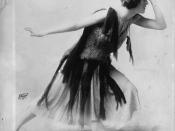Bathtub gin, speakeasies, hot jazz, the Charleston. . . A wild era, a romantic era. Thorougly modern. In the 1920's, hope sprung afresh from the battlefields of Europe, a new freedom. The United States had been engaged in a major European war and had been on the winning side. The farmboys returned home, itching to live in the city. Flappers were bobbing their hair, rolling down their stockings, raising their hemlines and wearing makeup.
The "sexual revolution" of the 1920's was merely a phrase coined by the advertising industry geared towards changing the plain, fresh-faced look of a woman. Sexual freedom became another image in the advertising world. "The out of control commercialization of sex, especially by Hollywood and Madison Avenue, reinforced gender stereotypes by emphasizing physical attractiveness as the most important feminine characteristic, a development that intensified women's passive role as both a consumer of beauty products and an object of consumption."
By wearing cosmetics, fashionable clothes, and other accessories, the ad industry expected to create the image of a sexy desirable female. "Every time a woman looks in her mirror she remembers man's confessed admiration for youth in feminine faces." The ad not only correlates women with beauty products, it also implies that women should look beautiful not for herself, but for a man. In conjunction with the "Sexual Revolution" the image of the flapper emerged. She was a powerful individual with sexual allure, who thought she was truly liberated from old, stuffy, prudish Victorian ways. From her bright red lipstick, bobbed hair and fashionable clothes to smoking cigarettes, petting and consuming alcohol, the 1920's individual was defied a rebel by the older generation. The image of a Flapper corrupted its elders and eventually overreached itself less through lack of morals than through lack of taste." The advertising...


